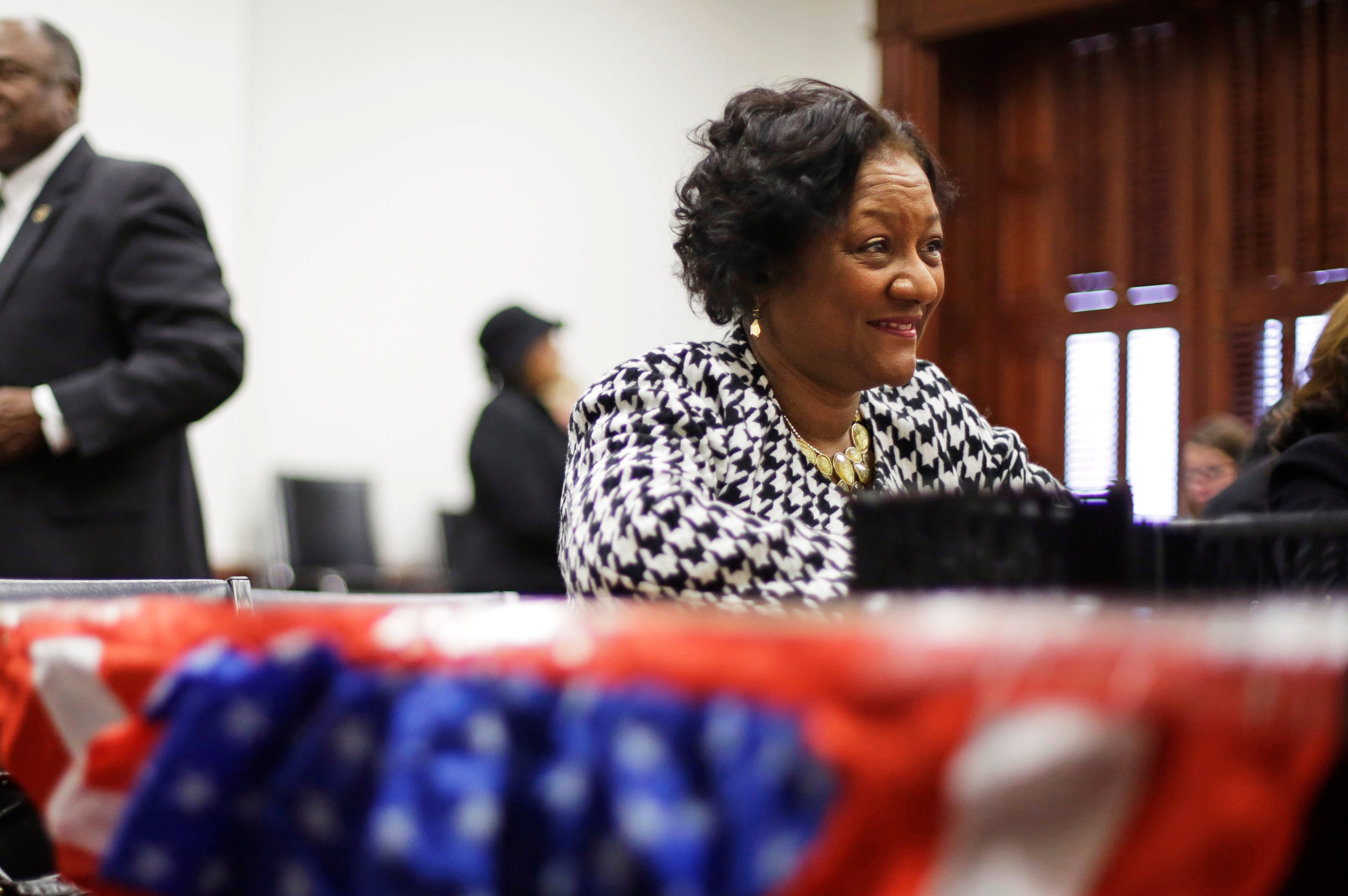State ethics panel: a watchdog with neither bark nor bite
The members of the state ethics commission, eager to bring order to one of the most disordered corners of state government, hired a “receiver” last week to heal their agency and then did they only thing they could. They hung up.
All five had phoned in for Thursday’s special meeting, creating the odd tableau of Executive Secretary Holly LaBerge and an aide staring at a speakerphone for half an hour.
Then the meeting adjourned, the speaker beeping as each commissioner rang off. LaBerge was left to explain why the commission was hiring someone whose duties appeared to overlap with her own.
“Contact my attorney,” she said.
Robert Constantine, a longtime Capitol insider, will be the receiver — a four-month job that will pay $16,000, Commission Chairman Kevin Abernethy said. The receiver will ensure that the agency is performing its legally required functions and will report back to commissioners on the performance of agency employees, Abernethy said.
But the job came with no description and Commissioner Hillary Stringfellow gamely asked whether Abernethy would please circulate Constantine’s resume following the vote.
‘We would not be a going concern’
The unprecedented move to hire Constantine comes at a yet another low point for the ethics commission, formally known as the Georgia Government Transparency and Campaign Finance Commission. The commission is the only independent state agency charged with monitoring the money behind campaigns and keeping politicians and lobbyists in line with ethics rules.
It does neither of those things well and has been struggling to do less with less for the past several years. The Legislature cut the agency’s budget by 41 percent from 2008 to 2012 and has restored only a portion of that money since. The staff has dropped from a 18 to 10 listed on the agency website.
Commissioner Heath Garrett, former chief of staff to Sen. Johnny Isakson, supported the hiring of Constantine, but he used the meeting to vent his frustration at serving on a commission he described as “bankrupt” both financially and structurally.
“If we were a private-sector entity we would not be a going concern,” he said. “We do not have the financial resources to function properly on a daily basis. We don’t have enough internal attorneys, we don’t have enough paralegals, we don’t have the ability to attract and recruit enough at the highest levels of professionals within the agency.”
State lawmakers, who approve the budget for the commission, have long said they give the agency enough money to operate and have given small increases in recent budgets. But Garrett said the commission needs “greater financial independence.”
His complaint echoes calls from watchdog groups and some lonely voices in the Legislature to remove the commission from the politics of the appropriations process and give it a guaranteed budget.
Garrett also said the state’s ethics laws need to be revamped to give the agency greater authority to investigate wrongdoing. To make his point the veteran Republican strategist used his strongest comparison.
“Our state laws on ethics is to ethics what Obamacare is to the health care industry,” he said. “It’s absolutely structurally flawed and unworkable.”
‘It’s a nonfunctioning state agency’
The decision to hire Constantine, a lawyer and former lobbyist who until recently was an administrative law judge for the State Board of Workers’ Compensation, is just the latest bizarre twist for the commission.
For the past 2 1/2 years, the agency has been mired in lawsuits and internal squabbles. This month, the FBI subpoenaed five people involved in the commission’s investigation of Gov. Nathan Deal’s 2010 campaign, including LaBerge and commission attorney Elisabeth Murray-Obertein.
The agency also is fighting lawsuits by the former executive secretary and her deputy, both claiming they were improperly dismissed. Former Executive Secretary Stacey Kalberman says she was forced out for investigating Deal’s campaign.
In his remarks on Thursday, Garrett used the term “legal morass” a dozen times to describe the situation.
Michael Jablonski, a Democratic lawyer who has represented politicians before the commission for 20 years, said he is amazed the agency continues to find new ways to decline.
“It’s a non-functioning state agency,” he said. “We saw it moving in that direction given the fact that they are underfunded and understaffed. They moved from that to the next level of descent, which is they started fighting internally and then changed personnel for whatever reason.”
Flying blind on the new ethics law
The chaos comes at a particularly inconvenient time. Large-scale ethics reforms passed this year kick in with the new year and will require the commission to be on top of its game.
House Bill 142 changes the way lobbyists operate at the Capitol, setting a $75 cap on some lobbyist spending and making many subtle changes to the lobbyist-lawmaker relationship. It also gave the commission a measure of power by enabling it to make and enforce rules governing officials’ conduct.
The Georgia Professional Lobbying Association submitted an 11-page letter Tuesday asking the commission for answers to dozens of questions it has about how the law is supposed to work. Some of the questions sound like SAT word problems.
On the gift limit, the association asked, “if four lobbyists take four public officials out to eat, can each lobbyist spend $75 on each public official or is the individual lobbyist only allowed to spend $75 total for the entire meal?” It’s not a silly question. If the former is correct, then a lawmaker in that situation could look forward to a $300 dinner.
If past performance is any indication of future results, the commission will need months to issue opinions on this or other questions about the reforms, meaning lobbyists and lawmakers will be flying blind until then.
Sen. Josh McKoon, R-Columbus, pushed for reforms to the ethics laws and said he expects lawmakers will take a cautious approach and review the results after the session. “Most members I’ve spoken to want to see us live under this a little bit,” he said.
The commission has another problem caused by the reforms. Usually lobbyists register for the coming session in the final weeks of the year, but House Bill 142 also reduced fees dramatically for lobbyist registration and thousands of lobbyists are required to wait to register until the new year. That flood of applications likely will tax the agency’s small staff as it struggles to process them before the start of the session on Jan. 13.
House Bill 143 requires lawmakers to file a report of how much campaign money they raised in January at the end of the month. The reform is meant to capture pre-session fundraisers, which in the past were not reported until well after the session ended.
Reporting is automated, but the commission has had technology problems in the past and could find the new filing deadline as another item on their crowded plate.
‘I understand they are pretty swamped’
The commission does not have a good reputation for carrying out its duties under current law.
A political generation ago, the board was known for handing out the occasional stiff fine for politicians and political action committees who did not play by the rules. Now it just receives reports and posts them online with hardly a glance.
“It’s a filing cabinet where nobody looks at the contents,” Jablonski said.
Last year the commission set a goal of randomly auditing 10 percent of the reports as a kind of good-faith effort to comply with the law. That never happened, and it’s not happening today, LaBerge said.
“Given the current staffing levels we are not able to do this so we attempted to do a random audit of filers using 10 percent as a goal,” she said. “This has not been possible with the work load our one auditor has. The complaint cases take priority over the random audit for obvious reasons.”
Constantine said he is there to help and perhaps to push for more resources from lawmakers.
“They may need some more authority and they need some new positions,” he said. “I understand they are pretty swamped.”
Deal, for his part, said he’ll leave that question up to lawmakers but that he won’t push for a change in scope. He’s long been wary of giving the ethics commission powers to turn what could be a minor filing problem into a major ethics investigation.
“We’ve tried to make it work as best we can, and I think we have some very highly qualified people who are members of the ethics commission,” Deal said in an interview last week. “And I feel sure that with the new power and the new money they have, we’ll see new regulations.”



